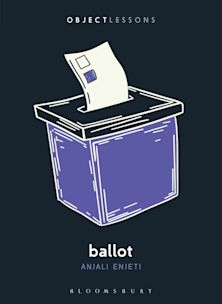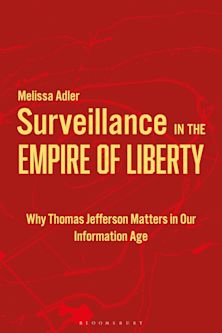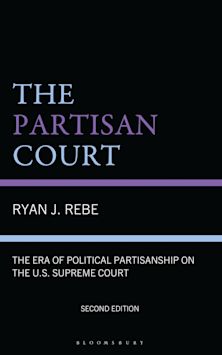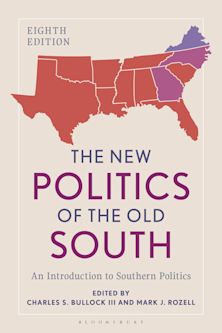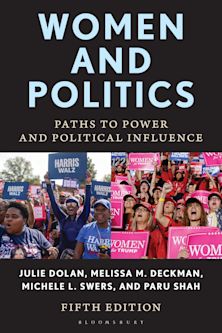- Home
- ACADEMIC
- Politics & International Relations
- American Government and Politics
- State of Recovery
State of Recovery
The Quest to Restore American Security After 9/11
State of Recovery
The Quest to Restore American Security After 9/11
You must sign in to add this item to your wishlist. Please sign in or create an account
Description
In the decade that followed 9/11, technologies and technology policies became central to homeland security. For example, the U.S. erected new border defenses with remote sensors and biometric scanners, and deployed new autonomous air warfare capabilities, such as the drone program. Looking at efforts to restore security after 9/11, the work examines issues such as the rise in technology spending, the various scenarios of mass terror, and America's effort to ensure that future engagements will take place far from the homeland. Operation Iraqi Freedom, Iran's emergence as nuclear threat, and North Korea's acceleration of its missile program are analyzed along with the "axis of evil" and America's effort to create a ballistic missile shield to thwart this emerging threat to its security. By focusing on the technologies of homeland security rather than on cyber warfare itself, the work offers a unique and needed survey that will appeal to anyone involved with the study and development of homeland and strategic security.
Table of Contents
by Ambassador David T. Killion / Introduction / Part I: Technology to the Rescue / 1: Moore's Law and the Evolution of Security Technology / 2: Information Security in a World of Cyber Insecurity / 3: Document Fraud: From Criminal to Terrorist Enterprise / 4: Business Continuity in Dangerous Times / Part II. Securing our Borders / 5: Border Security and the War on Terror / 6: Counterterrorism Mentors: Allied Insights and Lessons / 7: Enhanced Border Surveillance for the Post 9/11 World / 8: Less Lethal Border Security Solutions: Midway Between 'Shout' and 'Shoot' / 9: Securing the Maritime Front: Protecting America's Seaports / 10: Securing the Southern Front / 11: Securing the Northern Front / Part III Protecting The Populace / 12 Air Rage: Aviation Insecurity After 9/11 / 13: Truck Bombing Shifts Into High Gear / 14: Underground Tremors: Securing the Metro / 15: Courtroom Violence and the War Against the U.S. Government / 16: Black Sunday Redux / 17: Special Delivery: Letter-Bombs Continue to Deliver a Lethal Message / 18: Bracing for Bioterror / 19: Nuclear Terrorism After 9/11: Rethinking the Unthinkable / Part IV: Ensuring our Survival: Thinking About the Unthinkable After 9/11 / 20: Nuclear Weapons and the War on Terror: Halting the Spread / 21: False Alarm: Saddam, WMD, And the GWOT's First Side Show / 22: Power Vacuum: Saddam's Fall and the Rise of Iran / 23: Nuclear Ambitions: Emergent Ballistic Missile Threats / 24: Securing the 'High Frontier': Missile Defense, from Hype to Hope / 25: The Axis of Evil Revisited: Reflection and Reassessment / Bibliography / Index
Product details

| Published | 28 Feb 2013 |
|---|---|
| Format | Ebook (Epub & Mobi) |
| Edition | 1st |
| Extent | 272 |
| ISBN | 9781441103246 |
| Imprint | Bloomsbury Academic |
| Publisher | Bloomsbury Publishing |
About the contributors
Reviews
-
State of Recovery provides a much needed comprehensive and informed assessment of the role technology and innovation plays among U.S. adversaries in their efforts to undermine U.S. national and international security interests. Zellen further provides an insightful look into what the U.S. is doing, through its own employment of technological means, to combat or circumvent adversarial efforts. Rooted in his exhaustive and astute understanding of this complex issue, his three-dimensional look goes a long ways toward filling a significant void in this body of literature.
Dr. David A. Anderson, Professor of Strategic Studies and William E. Odom Chair of Joint, Interagency and Multinational Operations, U.S. Army Command and General Staff College, Fort Leavenworth, Kansas, US
-
In our algorithmic age, Zellen focuses on the contributions that technologists working across many disciplines have made in developing a new type of security, filling the vacuum left by those attacks. As in his previous books, the level of analysis is the individual but here with an added dimension: the social networks in which individuals are embedded and lead their lives.
Timothy R. Tangherlini, Professor, Department of Asian Languages and Cultures, UCLA, US
-
Zellen effectively comingles two important factors, promises of technological advances and engineering security for all Americans in the terrible and long struggle against global terrorism. That American policies and innovative technologies appear to have succeeded in preventing an attack on the homeland for more than a decade provides some comfort, but an insistence prevails that work continue. It is necessary to recognize the complexity and multiplicity of conflict that divides our world into friends as foes. This study will inform and advise us into the future.
Daniel R. Mortensen, PhD, Dean, Air Force Research Institute, Maxwell AFB, AL, US
-
If you have an addiction for the writings of P.W. Singer on the impact of technology on national security, or Benjamin Sutherland who writes about impact of technology on defense, society, and the economy for The Economist, you will enjoy immersing your mind with Zellen's, State of Recovery. It is a multi-disciplinary look at how technology has changed the United States, her allies and her adversaries, coupled with how the militant Islamist adversary, like al-Qaida, has adapted using technology.
CDR Youssef Aboul-Enein, USN, Adjunct Islamic Studies Chair, National Defense University's Eisenhower School for National Security and Resource Strategy, US
-
In this wonderfully detailed historical mosaic, Zellen recreates the fascinating but often unsung efforts by thousands of America's technology and policy professionals who worked to restore homeland security after 9/11. Their mission - outsmart a new opponent in this epic struggle that defines our age. A must read for security and technology professionals, and for anyone recalling those darkest of days after the attacks on New York and Washington. It is a tale of overcoming fears, restoring hope and the erasure of America's collective state of despair.
Alan Tidwell, Director, Center for Australian and New Zealand Studies, Edmund A. Walsh School of Foreign Service, Georgetown University, US

ONLINE RESOURCES
Bloomsbury Collections
This book is available on Bloomsbury Collections where your library has access.













